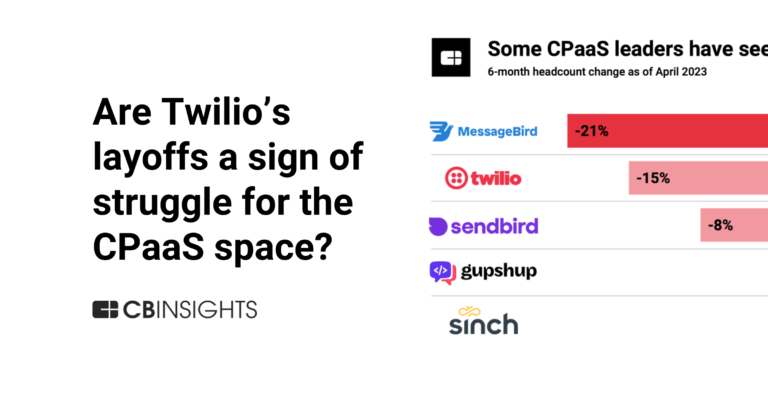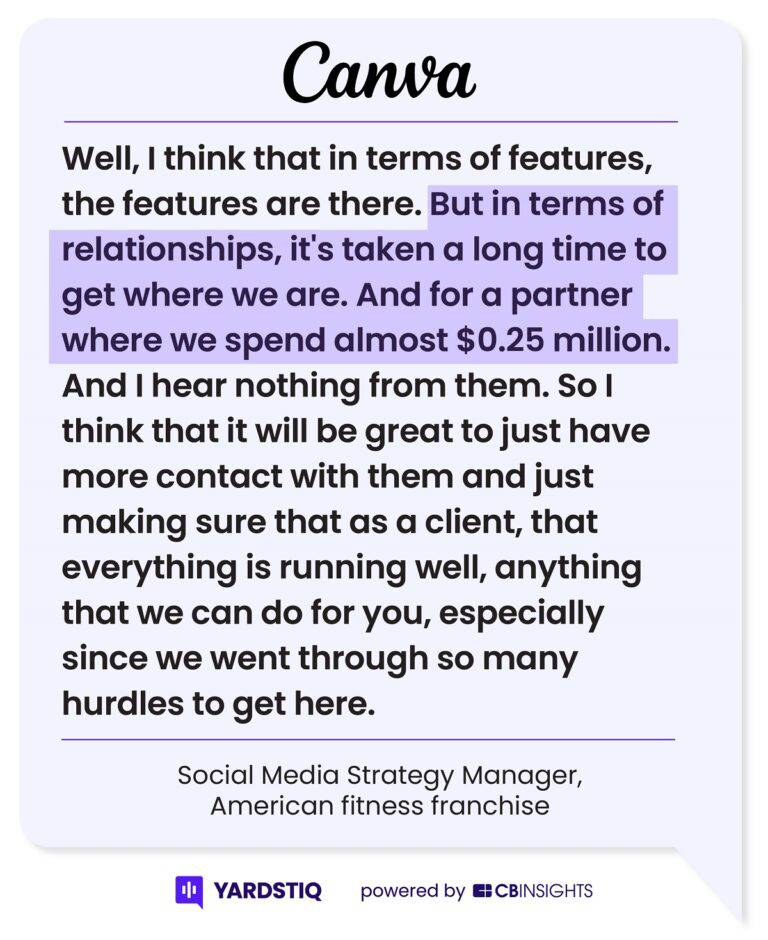
GupShup
Founded Year
2004Stage
Series F - II | AliveTotal Raised
$387MValuation
$0000Last Raised
$240M | 4 yrs agoRevenue
$0000Mosaic Score The Mosaic Score is an algorithm that measures the overall financial health and market potential of private companies.
-106 points in the past 30 days
About GupShup
GupShup operates as a conversational engagement platform that provides customer lifecycle tools within the messaging industry. The company offers services including two-way conversation facilitation, click-to-chat advertisement (ad) management, and domain-specific artificial intelligence (AI) models. GupShup serves sectors such as banking, financial services, and insurance (BFSI), retail and electronic commerce (eCommerce), healthcare, and various other industries that require customer engagement solutions. It was founded in 2004 and is based in San Francisco, California.
Loading...
GupShup's Product Videos
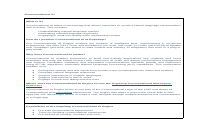
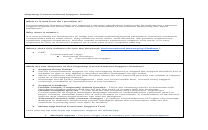
ESPs containing GupShup
The ESP matrix leverages data and analyst insight to identify and rank leading companies in a given technology landscape.
The retail AI agents market provides AI-powered conversational agents that enhance e-commerce and retail customer experiences through automated support and sales assistance. These agents use natural language processing and machine learning to handle customer inquiries, product recommendations, order management, and automated query resolution across chat, email, and voice channels. Solutions includ…
GupShup named as Highflier among 13 other companies, including DRUID, Sierra, and Yellow.ai.
GupShup's Products & Differentiators
Conversational Automation
As users adopt and acclimatise to newer, more advanced communication channels like WhatsApp, Instagram, FB Messenger etc, scalable automation of conversations is the need of the hour. Guphup offers automation of incoming user messages at scale using structured input as well NLP and AI based parsing techniques. Conversational automation improves savings and increases revenues by addressing the 80:20 spread of end user conversation with accuracy and in real time i.e 80% of users need help with the top 20% questions/issues. Conversational automation also helps in bringing standardization of end user experience across all communication channels.
Loading...
Research containing GupShup
Get data-driven expert analysis from the CB Insights Intelligence Unit.
CB Insights Intelligence Analysts have mentioned GupShup in 3 CB Insights research briefs, most recently on May 17, 2023.
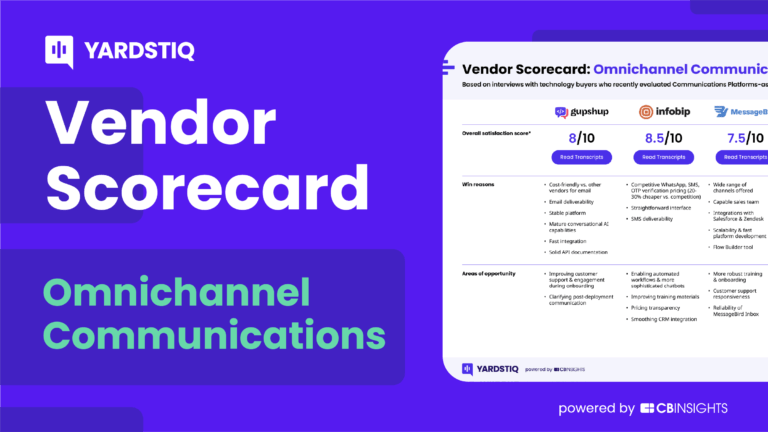
Oct 26, 2022 report
Top omnichannel communications companies — and why customers chose themExpert Collections containing GupShup
Expert Collections are analyst-curated lists that highlight the companies you need to know in the most important technology spaces.
GupShup is included in 4 Expert Collections, including Unicorns- Billion Dollar Startups.
Unicorns- Billion Dollar Startups
1,276 items
Sales & Customer Service Tech
739 items
Companies offering technology-driven solutions to enable, facilitate, and improve customer service across industries. This includes solutions pre-, during, and post-purchase of goods and services.
Tech IPO Pipeline
257 items
The tech companies we think could hit the public markets next, according to CB Insights data.
Artificial Intelligence
10,049 items
GupShup Patents
GupShup has filed 9 patents.
The 3 most popular patent topics include:
- social networking services
- instant messaging clients
- videotelephony

Application Date | Grant Date | Title | Related Topics | Status |
|---|---|---|---|---|
6/30/2022 | 12/10/2024 | Instant messaging clients, Social networking services, Videotelephony, Social media, Windows instant messaging clients | Grant |
Application Date | 6/30/2022 |
|---|---|
Grant Date | 12/10/2024 |
Title | |
Related Topics | Instant messaging clients, Social networking services, Videotelephony, Social media, Windows instant messaging clients |
Status | Grant |
Latest GupShup News
Jun 13, 2025
Copied As businesses across India accelerate the adoption of GenAI, the demand is shifting from scripted chatbots to intelligent, autonomous agents capable of delivering outcomes. Gupshup is leading this evolution by deploying domain-specific AI Agents that are locally contextual, compliant by design, and ready to scale across Tier 2–3 markets. In this exclusive conversation, Krishna Tammana, CTO, Gupshup, shares how Gupshup is advancing India’s AI journey — from no-code platforms for regulated industries to language-first innovations for a multilingual population. At the helm of Gupshup’s technology and engineering strategy, Krishna is focused on building AI systems that are secure, scalable, and human-centric, particularly for high-stakes sectors like BFSI and healthcare. With over 20 years of leadership experience at global tech firms including Talend, Splunk, E*TRADE, and Sybase, he brings deep expertise in cloud infrastructure, data architecture, and SaaS transformation. Q With AI adoption booming across APAC and India amid rising concerns around trust, security, and job displacement, how is Gupshup enabling innovation while addressing these critical consumer anxieties in sensitive sectors like BFSI and healthcare? A AI adoption promises major efficiency gains but also raises critical challenges, especially in sensitive sectors like BFSI and healthcare. Concerns around data privacy, regulatory compliance, transparent AI decision-making, and workforce impact can slow down enterprise AI integration. To address this, organizations need AI systems that are secure, explainable, and trustworthy by design. That’s where Gupshup comes in. We address these by embedding strong guardrails and compliance protocols within our AI Agents. Our recently launched Agent Library offers specialized, pre-trained AI models designed for specific business functions such as customer onboarding and claims processing. These agents provide reliable, context-aware responses while maintaining strict control over tone, accuracy, and data privacy, ensuring alignment with regulatory standards. For instance, Tonik Bank uses Gupshup’s ACE LLM-powered AI agents to automate 75 percent of customer queries, enabling a 4.3 times boost in team productivity and projected savings of over $20 million in three years. In healthcare, AI adoption faces similar challenges including the need for high accuracy in patient interactions, and the importance of maintaining empathy and trust. AI solutions can support healthcare providers by automating appointment scheduling, patient follow-ups, and administrative tasks, thereby improving efficiency while ensuring compliance and patient confidentiality. Q As the industry shifts from reactive chatbots to autonomous agentic AI, how is Gupshup evolving its platform to lead this transition and differentiate itself in a crowded conversational AI market? A The conversational AI landscape is shifting from reactive chatbots to autonomous agents that manage complex workflows, personalize interactions, and deliver complete customer journeys. Businesses are recognizing the need to evolve with this shift and embrace digital assistants that drive real outcomes. In response, Gupshup has enhanced its platform and introduced its AI Agent Library. These pre-built, domain-specific agents are optimized for use cases across industries such as banking, insurance, retail, and utilities. Each agent comes configured with enterprise-grade features like tone control, fallback protocols, data privacy safeguards, and real-time system integrations. Unlike traditional scripted chatbots, Gupshup’s agents are trained to manage structured tasks such as lead generation, appointment booking, support requests, and onboarding. The platform includes tools for deployment, monitoring, analytics, and continuous improvement. Enterprises can configure these agents without writing code, using a no-code interface that aligns with security and compliance standards. To accelerate adoption, Gupshup allows businesses to “rent” AI agents instead of building from scratch. This model supports faster go-to-market and reduces dependency on engineering resources. Its platform also supports multilingual and multimodal channels including messaging apps and voice, enabling broader reach and consistent customer experiences. Q How is Gupshup’s no-code platform balancing enterprise-grade customization and compliance to empower regulated industries like finance and healthcare to deploy precise, brand-aligned AI agents without deep developer involvement? A In regulated industries like finance and healthcare, AI adoption is growing, but so are the barriers. Strict compliance requirements, the need for customization, and limited developer resources can slow deployment. Enterprises need ways to move fast without compromising control, safety, or brand alignment. Gupshup’s no-code platform addresses this with pre-built AI Agents tailored to specific business use cases. These agents integrate securely with enterprise systems to enable real-time, compliant interactions. Enterprises can quickly deploy AI-driven workflows for customer support, onboarding, and lead generation, without building from scratch. The platform also includes tools for ongoing monitoring, analysis, and refinement. Customers can choose which parts of a flow AI should handle using configurable hooks in the no-code interface. Gupshup also offers out-of-the-box agentic AI packages. Deployment involves connecting data sources, configuring behavior, and light tuning, which Gupshup handles. Each month, tuning becomes easier as more out-of-the-box agents require minimal adjustments. Increasingly, businesses in sectors like real estate, retail, and finance prefer renting these AI agents. This enables faster, scalable, and compliant adoption all without the burden of building and maintaining complex infrastructure. Q Drawing from your experience at Talend and Splunk, what are the key infrastructure and integration challenges you've faced at Gupshup, and what are your top technology priorities heading into 2025? A In the context of AI, our workloads for most part are very manageable. The key aspect of making this work is to deliver quality at the right performance. Out of the box, LLMs are slow when you choose high quality and can hallucinate if you choose performance. What we do to achieve both is to take smaller models that are fast but fine tune them for our use cases and industries to ensure high quality. Fine tuning does require infrastructure that is expensive and can take some time to run. This too is getting faster and cheaper by the day. Q As Indian enterprises adopt GenAI-powered CX for multilingual and Tier 2–3 markets, how is Gupshup optimizing its tools and architecture to scale across local infrastructure gaps and cultural complexities? A Serving India’s Tier 2 and 3 markets with GenAI customer experiences requires more than translation. It demands contextual, culturally aware, multilingual AI that scales across local infrastructure challenges. Enterprises need conversational platforms that balance personalization with performance in mobile-first, low-bandwidth environments. Gupshup is one of the few companies providing the necessary infrastructure, architecture, and AI capabilities. Our platform supports local languages and popular messaging channels like WhatsApp and RCS, enabling authentic regional engagement. We also integrate voice AI, allowing natural speech interactions in preferred languages, essential in markets with lower literacy or limited text use. We support multiple languages for GenAI-powered CX through our own ACE LLM. This LLM can be configured, trained, and deployed anywhere, supporting many languages. Our brands have served Tier 1, 2, and 3 markets and continue to do so thanks to this language support and regional deployment flexibility. Our AI Agents are personalized and integrate with enterprise systems to handle diverse intents efficiently, even under infrastructure constraints. This enables enterprises across retail, BFSI, and government to deliver GenAI-powered experiences that truly resonate, unlocking deeper engagement and trust.
GupShup Frequently Asked Questions (FAQ)
When was GupShup founded?
GupShup was founded in 2004.
Where is GupShup's headquarters?
GupShup's headquarters is located at 415 Jackson Street, San Francisco.
What is GupShup's latest funding round?
GupShup's latest funding round is Series F - II.
How much did GupShup raise?
GupShup raised a total of $387M.
Who are the investors of GupShup?
Investors of GupShup include Tiger Global Management, Fidelity Investments, White Oak Capital Management, Harbor Spring Capital, Malabar Investments and 12 more.
Who are GupShup's competitors?
Competitors of GupShup include Connectly, CommBox, Blip, Trengo, Zeals and 7 more.
What products does GupShup offer?
GupShup's products include Conversational Automation and 4 more.
Who are GupShup's customers?
Customers of GupShup include Credit Wise Capital, Meluka Honey and Doubtnut.
Loading...
Compare GupShup to Competitors

Ada specializes in artificial intelligence (AI) powered customer service automation within various business sectors. The company offers a platform that enables enterprises to resolve customer inquiries efficiently across multiple channels and languages without the need for extensive human intervention. Ada's solutions cater to industries such as e-commerce, financial technology, software as a service (SaaS), and gaming. It was founded in 2016 and is based in Toronto, Canada.

Verloop specializes in conversational AI and customer support automation within various business sectors. The company offers a platform that automates customer interactions across multiple channels, providing AI-driven chat and voice support, real-time analytics, and agent assist tools. Verloop primarily serves sectors such as e-commerce, banking and financial services, travel, real estate, logistics, insurance, food tech, edtech, and telecom. It was founded in 2017 and is based in Bangalore, India.

Inbenta specializes in conversational AI and automation within the customer service sector. The company offers a suite of products, including AI-enabled chatbots, search tools, and knowledge management systems designed to enhance customer experience and streamline service operations. Inbenta's conversational AI platform is utilized across various industries to automate customer interactions, provide self-service options, and improve overall customer satisfaction. It was founded in 2005 and is based in Allen, Texas.

Intercom provides a customer service platform that utilizes artificial intelligence to assist with customer support. It has developed a support agent named Fin, which responds to customer inquiries, along with tools such as an inbox, ticketing system, and reporting features. Its platform is applicable in sectors like financial services, software and technology, and healthcare. It was founded in 2011 and is based in San Francisco, California.

ICM Hub develops AI solutions for the aviation industry, focusing on passenger interactions and airline operations. The company provides chat and voice-enabled AI assistants that assist with customer service processes and integrate with aviation APIs for real-time information. ICM Hub serves the aviation sector, offering tools for pre-flight, in-flight, and post-flight customer engagement. It was founded in 2016 and is based in New York, New York.

Infobip operates in omnichannel engagement within the telecommunications and customer experience sectors. The company provides a platform for customer engagement, offering tools and solutions for messaging, authentication, and security. Infobip's services assist businesses in managing consumer communications and ensuring secure interactions across various channels. It was founded in 2006 and is based in London, United Kingdom.
Loading...

